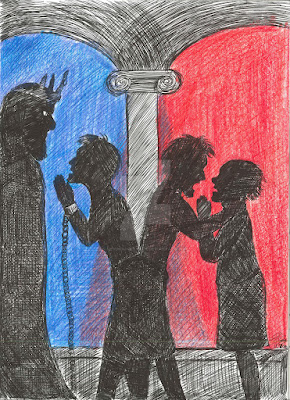Eugene Burnand
26th Sunday of the Year A
Readings: Ezekiel 18:25‑28 Philippians 2:1‑11
Matthew 21:28‑32
A central doctrine of both Judaism and Christianity is that God's mercy calls sinners to repentance. Both religions reject a fatalism that would say people are predetermined in their conduct, and, instead, take the hope-filled position that God's mercy always makes it possible for the sinner to freely turn from a life of sin and find the new life God offers. The correlative truth, however, is that the good person may turn from virtue and life to iniquity and death. As we struggle in freedom to embrace God's mercy, let us pray in the words of the responsorial psalm:
Your ways, O Lord, make known to me;/
teach me your paths,/
guide me in your truth and teach me,/
for you are God my savior. (Ps 125:4‑5)
In the Ezekiel reading, the prophet is instructing the Israelites who are complaining that “the Lord's way is not fair!” They are enduring twin tragedies: the destruction of Jerusalem and the exile to Babylon, and many, believing that these punishments are due not to their own sins but those of their forefathers, are complaining: ‘Fathers have eaten green grapes,/ but their children's teeth are on edge.’ In response to this complaint Ezekiel insists on both God's mercy and justice and the corresponding freedom and responsibility of each Israelite. On the one hand, if a virtuous person turns to sin, death will result. But, on the other, if a wicked person rejects sin and does what is right and just, "he shall surely live, he shall not die." The virtuous are to persevere, and the wicked are to repent.
The second reading continues the selections from Philippians with Paul's magnificent hymn to Christ who triumphed over sin through self‑emptying love. In the context of exhorting the Philippians to give up selfish and petty jealousy, Paul uses this early Christian hymn as the foundation for the Christian life of selfless love. The pattern, established in Jesus, of death to self and resurrection through God's power is to mark the life of the community. Christ, in contrast to his anti-type Adam, did not grasp at being godlike, but, like the suffering servant in Second Isaiah, took the form of a slave and emptied himself by becoming fully human, even to the point of obediently accepting the degradation of death on a cross. God responded to this act of self emptying love by exalting Jesus and bestowing on him lordship over the cosmos, so that at the mention of his name all beings in the universe might acknowledge him as Lord and Messiah.
Jesus' parable about the two sons is addressed to the chief priests and elders who are challenging his authority for cleansing the Temple. This bitter controversy will lead to their decision to arrest and execute him. After they had questioned him about his authority to drive the money changers out of the Temple, Jesus responded by asking them whether John's baptism was “from God” or “from human origin.” Jesus’ challenge exposes their hypocrisy. For, if they say, “from God,” Jesus would ask why they had not believed in John's call to repentance, and, if they say, “of human origin,” they fear the crowd who revered John as a prophet. Caught in their hypocritical web, they refuse to answer.
Now Jesus challenges the chief priests and elders to repent by asking them to judge the case he proposes in the parable. A father has two sons. When the first son is asked to work in his vineyard, he says, “I am on my way, sir;” but he never went. On the other hand, the second son initially refuses to obey his father's command, but “afterward (he) regretted it and went.” Jesus then asks the leaders, “Which of the two did what the father wanted?” After they answer, “the second,” Jesus uses the parable to contrast their response to John's preaching with that of the "tax collectors and prostitutes." The later, like the second son, repented of their sins when they heard John's preaching and thereby “are entering the kingdom of God.” The leaders, however, like the first son, claim to be willing to do the father's will, but “put no faith” in John's preaching, even after they saw the repentance of the tax collectors and prostitutes. Their smug religiosity keeps them from true repentance and belief in God's call through John's preaching.
God's call is both challenge and offer of mercy. If we have said "yes" to God, we must always ask, "Have I followed through in deeds?" If we have rejected God in the past, we must remember His mercy always offers the opportunity for repentance and change.



